Unit 1 要点复习
八年级unit1知识点
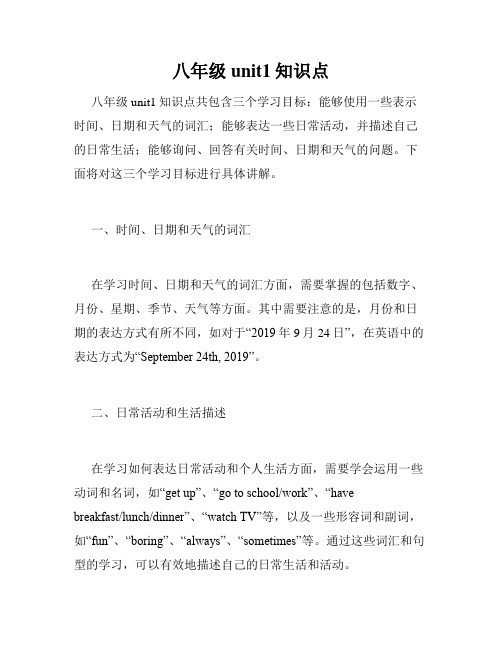
八年级unit1知识点八年级unit1知识点共包含三个学习目标:能够使用一些表示时间、日期和天气的词汇;能够表达一些日常活动,并描述自己的日常生活;能够询问、回答有关时间、日期和天气的问题。
下面将对这三个学习目标进行具体讲解。
一、时间、日期和天气的词汇在学习时间、日期和天气的词汇方面,需要掌握的包括数字、月份、星期、季节、天气等方面。
其中需要注意的是,月份和日期的表达方式有所不同,如对于“2019年9月24日”,在英语中的表达方式为“September 24th, 2019”。
二、日常活动和生活描述在学习如何表达日常活动和个人生活方面,需要学会运用一些动词和名词,如“get up”、“go to school/work”、“havebreakfast/lunch/dinner”、“watch TV”等,以及一些形容词和副词,如“fun”、“boring”、“always”、“sometimes”等。
通过这些词汇和句型的学习,可以有效地描述自己的日常生活和活动。
三、时间、日期和天气的交流在学习如何询问和回答有关时间、日期和天气的问题方面,需要通过一些句型和表达方式来掌握。
常用的交流方式包括:“What time is it now?”、“What’s the weather like today?”、“What’s the date today?”等。
而在回答方面,需要熟练掌握表示时间、日期和天气的词汇和表达方式,以便能够直接回答问题并进行进一步的交流。
总之,八年级unit1的知识点涵盖了时间、日期和天气的词汇、日常活动和生活描述以及时间、日期和天气的交流三个方面,需要通过不断的练习和实践来掌握和提高。
希望同学们能够认真学习和掌握这些知识点,以便更好地运用英语进行交流和表达。
英语人教版八年级上unit1知识点笔记

Un i t 1 Wh e re d id yo u g o on v acation?1•一般过去时考点1:如何判断一般过去时?考点2:肯定句变否定句。
考点3:变一般疑问和特殊疑问句。
2•复合不定代词/副词构成: _________ _________ ___________ _________其中:(no one意思“______ ”指 __ ,与_________ 同义,且与of连用,做主语谓语用单三。
回答引起的特殊疑问句时要用no one.none意思“ ___ ”,指____________ ,且 __ 与of连用。
谓语单,复形式皆可。
回答 _________ 引起的特殊疑问句时要用none;-anyone意思" _____ ”扌旨___ ,与 __ 同义,且_____ 与of连用。
_any one 意思" ____ ”扌旨___ ,与 __ 同义,且_____ 与of 连用。
nothing= _________________用法:① 复合不定代词做主语,谓语动词用 ________ •②当adj.修饰不定代词要_________ •③ 当不定代词中含有some通常用于__________ ;含有any通常用于_______________我自己myself你自己他自己她自己它自己我们自己你们自己他们自己反身代词在句中可用作动词宾语、介词宾语、表语和同位语等,如:She can dress herself.作动词宾语)That?poor?boy?was?myself.(用作表语)Thefatherhimselfhassomething wrong.(同位语:句中常置于名词、代词之后或句子末尾We clean the room ourselves.(同位语:句中常置于名词、代词之后或句子末尾常用短语:穿衣服;?玩得快乐;随便吃;随便用;2.few 意为___________,修饰__________ 名词,倾向于否定。
人教版八年级英语下册 Unit 1 What’s the matter?知识点复习

人教版英语八年级下册第一单元知识点过关Unit 1 What’s the matter?一、重点短语1. have a fever 发烧,具体运用:She has a fever and she should lie down and rest.2. have a cough 咳嗽,cough既可以作名词,也可以作动词3. have a toothache 牙疼;tooth牙齿+ ache疼痛toothache 牙痛4. talk too much 说得太多;类似短语:eat too much吃太多5. drink enough water 喝足够的水;take enough money带够钱6. have a cold 受凉、感冒;也可以用catch a cold7. have a stomachache 胃疼;stomach胃+ache疼痛stomachache 胃疼8. have a sore back 背疼;sore疼痛+back背sore back背疼9. have a sore throat 喉咙痛10. lie down and rest 躺下休息11. hot tea with honey 加蜂蜜的热茶;with表示“带有”12. see a dentist 看牙医;看医生用“see”13. get an X-ray 拍X 光片14. take one’ s temperature 量体温;量体温、服药都用“take”15. put some medicine on sth. 在……上面敷药;例如:put some medicine on the cut在切口处敷药16. feel very hot 感到很热;feel感官动词,后接形容词17. sound like 听起来像;例如:sounds like a good idea 听起来像个好主意18. all weekend 整个周末;类似短语:all day \ all night \ all month19. in the same way 以同样的方式20. go to a doctor 看医生21. go along 沿着……走;类似短语:walk along22. on the side of the road 在马路边23. shout for help 大声呼救24. without thinking twice 没有多想;without是介词,后接动词ing形式25. get off 下车;反义词get on上车26. have a heart problem 患有心脏病27. to one’ s surprise 使....... 惊讶的;例如:to my surprise \ to his surprise28. thanks to 多亏了、由于;例如:Thanks to the the doctors , the patient was saved in time. 多亏了医生们,这个病人及时被救了。
Starter Unit1 基础知识点复习

Starter Unit1 基础知识复习一、重点词汇和短语1、good adj. (反义词:bad)(1)好的;令人愉快的A good book 一本好书have a good time 玩得愉快(2)有益的,有效的,适宜的Milk is good for you. 牛奶对你有益。
➢搭配:be good at 擅长be good for 对……有好处/有用be good to 对…… 好/和善例:Sonia, do you think you are different from LindaYes, I’m _____ at drawing than her.A.betterB. goodC. wellD. best[解析]句意:索尼亚,你认为你和琳达不同吗是的,我比她擅长画画。
由than her 可知要用比较极,故A正确。
morning, Helen! 早上好,海伦!“Good morning!”意为“早上好!”或“上午好!”,是正式问候用语,用于早晨向他人问好。
它的回答语仍用“good morning!”。
[拓展链接]:(1)在非正式场合,good可以省略,只用morning互相致以问候。
(2)类似的问候语用法如下表所示:注意:Good night!并不是问候语,而是晚上分别时或就寝前的道别用语,它的含义是“晚安”“再见”。
例:Good morning, Miss Zhang!____________!A. Good morningB. Good afternoonC. Good eveningD. Good night[解析]本题考查交际用语。
A项,早上好。
B项,下午好。
C项,晚上好。
D项,晚安。
句意:早上好,张老师。
早上好。
问候语Good morning 还是用Good morning 来回答。
故A正确。
3、fine adj.(1)晴朗的 a fine day(2)健康的(healthy),身体很好的。
人教版六年级上册英语第一单元Unit1《How can I get there?》重要知识点总结

【精选】人教pep版六年级上册英语第一单元Unit1《How can I get there?》重要知识点总结Unit1 How can I get there?一、重点单词和短语Science科学museum博物馆post office邮局bookstore书店cinema电影院hospital医院tasty美味的,可口的London Eye伦敦眼stomach胃crossing十字路口turn left/turn right向左/右转go straight=walk straight直走next to紧挨着/与……相邻far from(离……远)near在……附近behind(在……后面)in front of(在……前面)between…and…(在…和…之间)二、重点句子1.How do you go to school? 你是怎样去上学的?2.where is the restaurant? 餐馆在哪里?3. Usually I go to school on foot. 我通常走路去上学。
4. Sometimes I go by bike. 有时候我骑自行车去。
5.问路之前,出于礼貌,我们要说“Excuse me”与后面的句子要用标点符号隔开。
6.Look at the traffic lights, remember the traffic rules. 看着交通灯,记住交通规则。
7.Stop at a red light.Wait at a yellow light. Go at a green light.红灯停。
黄灯等一等。
绿灯行。
8.Red means stop, yellow means wait, green means go. 红色的意思是停止,黄色的意思是等待,绿色的意思是通行。
9.How can I get to the park? 我该怎样到达公园呢?10.You can go by the No.15 bus. 你可以坐15路公交车去。
英语七年级上册牛津版Unit 1 单元知识要点
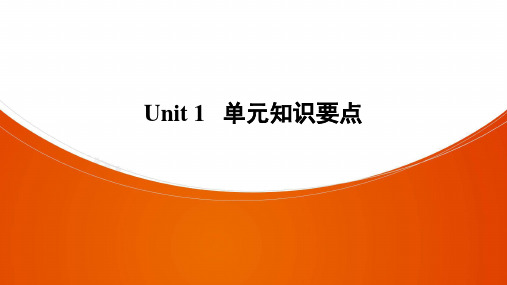
返回目录
Unit 1
单元知识要点
三、不定冠词 a,an 的用法 a 用在以辅音音素开头的词前面,例如:
a man(一个男人);a university(一所大学);a hat(一顶帽子); a European(一个欧洲人)
country n.国家 countryside n.乡村
dream = a series of mental images occurring during sleep n. 梦 dreamer n. 梦想家,不切实际的人
返回目录
Unit 1
单元知识要点
US = United States n. 美国 engineer = a person who use scientific knowledge to solve practical problems n. 工程师 engine n. 引擎 mountain = hill n.山 world = universe = earth n.世界 flat =apartment n.公寓
返回目录
Unit 1
单元知识要点
you→(反身代词)yourself/yourselves country→(复数)countries dream→(动词过去式)dreamed engine→(指人的名词)engineer old→(比较级)elder/ older
返回目录
Unit 1
单元知识要点
返回目录
Unit 1
单元知识要点
特殊疑问词 意思
what
什么
who when
where
谁 什么时候
哪里
用法
用于询问职业或事物是什么
用于询问人的身份 用于询问时间 用于询问地点
unit1知识点

unit1知识点
以下是Unit 1的知识点:
1. 问候和自我介绍:
- 问候的常用表达:Hello, hi, good morning/afternoon/evening, how are you?
- 自我介绍的常用句型:My name is xxx. I am xx years old. I come from xxx.
2. 介绍家庭成员:
- 家庭成员的称呼:father, mother, brother, sister, grandparents, etc.
- 介绍家庭成员的常用句型:This is my father/mother/brother/sister. His/Her name is xxx.
3. 询问和回答个人信息:
- 询问名字:What's your name?/What's your full name?
- 询问年龄:How old are you?
- 询问国籍:Where are you from?
- 回答个人信息的常用句型:My name is xxx. I am xx years old. I come from xxx.
4. 简单的日常用语:
- 感谢:Thank you. Thanks a lot.
- 道歉:I'm sorry. I apologize.
- 请问:Excuse me, can I ask you a question?
5. 时态:
- 一般现在时:表述经常发生的事情、事实和真理。
- 现在进行时:表示现在正在进行或发生的动作。
这些是Unit 1的主要知识点,希望对你有帮助!。
人教九年级英语全册Unit1复习(共28张PPT)
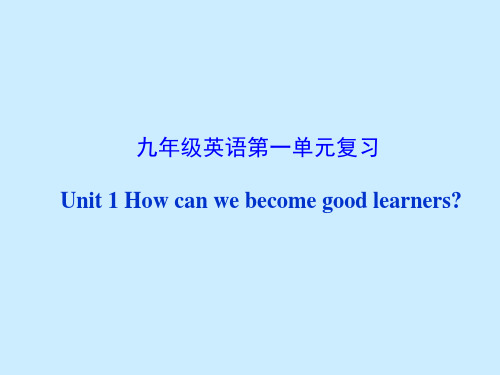
Link in the exam
1. You can study grammar______memorizing it.
A. with B. by
• 要求:
• 书写字迹工整规范,讲解仪态大方,语 言准确精炼。
Studying goals
1.掌握本单元重点词汇conversation 、aloud sentence、discover、secret、grammar等。 2.重点短语: study with a group, speaking skills, not…at all, end up doing sth., spoken English, first of all, 3.在掌握重点短语、语法结构的基础上会写作文 。
C. on
D. at
2. Mr. White goes to work______subway every day.
A. in
B. on
C. at
D. by
3. You can read faster by______word groups.
A. read B. reading C. to read
❖ Later, with the help of the teacher and my classmates, I listened to the teacher carefully in class, kept on reading English every day and spoke English as much as possible(尽可能多地). Step by step(逐 步地) I made great progress in English.
Unit 1 People of achievement (教师版) 2025年高考英语一轮复习考点

单元提升卷01Unit1People of achievement单元基础知识巩固Ⅰ.核心单词1.vital adj.必不可少的;极其重要的;充满生机的2.defeat n.失败;挫败vt.击败;战胜3.evaluate vt.评价;评估4.acknowledge vt.承认(属实、权威等);(公开)感谢5.encounter vt.偶然碰到;遇到n.邂逅;遭遇6.obtain vt.(尤指经努力)获得;赢得vi.(规章、习俗等)存在;流行7.extraordinary adj.不一般的;非凡的;意想不到的mit vt.承诺;保证(某个人、机构等)vi.忠于;全心全意投入(工作、活动等)9.infer vt.推断;推定10.circumstance n.条件;环境;状况Ⅱ.拓展单词1.distinct adj.清晰的;清楚的;有区别的→distinction n.差别2.novel n.(长篇)小说→novelist n.小说家mit vt.承诺;保证(某个人、机构等)vi.忠于;全心全意投入(工作、活动等)→committed adj.尽心尽力的;坚定的;坚信的→commitment n.承诺;交托;信奉4.conclude v.得出结论,结束;终止→conclusion n.结论;推论5.apparent adj.显而易见的;显然的;表面上的→apparently adv.显而易见;看来;显然6.science n.科学→scientist n.科学家→scientific adj.科学(上)的;关于科学的7.academy n.(艺术、文学、科学等的)研究院;学会;专科院校→academic adj.学业的;学术的8.object n.物体;对象;客体→objective n.目标;目的adj.客观的9.botany n.植物学→botanical adj.植物学的10.politic n.政治学→politician n.从政者;政治家;政客III.核心短语1.with the objective of(doing)以(做)……为目的2.insist on坚决要求3.wear and tear(正常使用造成的)磨损;损耗e to power(开始)掌权;上台5.take up a position担任;任职6.sum up总结;概括7.get stuck进入僵局;被卡住8.by chance偶然;意外地9.lead to导致,通向10.stand up to经得起;抵抗;勇敢地面对一、单句语法填空1.Parents are more willing(acknowledge)their children as adults when they behave like adults. 2.It is vital importance that you follow all safety rules.3.There are no obvious(distinct)between the two designs.4.That’s the(conclude)scientists in Cambridge have drawn from an experiment with tens of thousands of volunteers.5.With her luggage in her hands,the girl stood looking round in all directions,but(apparent)no one had come to meet her.6.The young scientist has just published a paper in the journal Nature(analyse)the fires. 7.Never doubt that a small group of thoughtful,(commit)citizens can change the world;indeed,it is the only thing that ever has.8.This volume of essays was designed(accompany)an exhibition in Seattle.9.This is an exciting moment for us,our astronauts successfully landed on Mars.10.He is the first to win such a big prize,father was out of work at that time.11.She came close to Dorothy and kissed her(gentle)on the forehead.12.It was(courage)of her to go into the burning building to save the child.13.He made an important(contribute)to the debate which was held last week.14.The robot was made by Boston Dynamics,a company(found)in1992by a professor. 15.An Olympic silver medal is a(remark)achievement for one so young.16.The success of the novels has made her the most highly paid(novel)in history.17.The students benefiting most from college are those who are totally engaged(参与)in(academy) life,taking full advantage of the college’s chances and resources.18.The locals obtained profit foreign visitors wanting to buy up property on their beautiful island.19.(infer)from the conversation,we can tell that the boy doesn’t want to go to France.20.The best way to get rid of a negative self-image is to realize that your image is far from(object). 21.The teacher urged students to insist on(read)English aloud every morning.22.However,technology is also the application of(science)knowledge to solve a problem,touching lives in countless ways.23.Try to spend your time just on the things you find worthy(do).24.He was appointed as the(art)director of the theatre.25.Distinct western paintings,Chinese paintings are more abstract.26.Personally,I prefer to work in a team,offers me a chance to learn how to get along with others. 27.is well known,China is a country with a long history.28.As a(journal),Tom always hast a good nose for a good story,so he does well in his job.29.As a(consequent),he was a burden to her,something she was forced to look after. 30.Currently AI is used(most)in the tech industry,where it has produced many new products. 1.to acknowledge【详解】考查动词不定式。
人教版九年级英语Unit1复习要点共14张PPT.
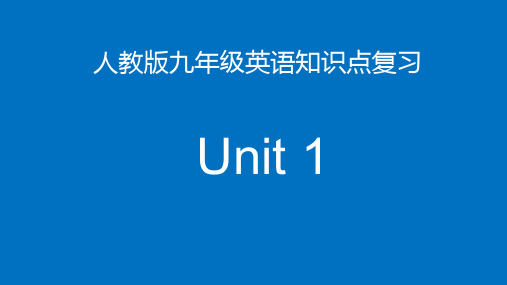
(2) I have remembered _C__ early every day.
A.get up B.got up C.to get up D.gets up
14. What about doing sth. ? 做某事怎么样?
6. find it + adj. to do sth. 发现做某事 ······
(1) (2018·眉山) We find __B_ impossible for us ____ a
foreign language well in a short time.
A. one;learn
B. it;to learn
river. 11. begin to do sth. 开始做某事
(1) 从我八岁时,我就开始跳舞了。 I have begun __t_o_d_a_n_c_e__ since I was 8 years old.
(2) 去年他开始学英语。 He _b_e_g_a_n_t_o_l_e_a_rn_ English last year.
(1) 回家怎么样?
What about __g_o_in_g__h_o_m_e___ ?
15. help sb. (to) do sth. help sb. with sth.
帮助某人做某事
(1) 我经常帮助妈妈做家务。
I usually help my mother __(_to_)_d_o__ housework.
8. practice doing sth. 练习做某事 (1) Do you often practice __B___ English at home?
人教版高中英语必修一复习UNIT 1

(1)be vital to/for ... 对……至关重要 It is vital to do sth. 做某事很重要 It is vital that ... (should) do sth. 做某事是十分重要的 (2)be of vital importance/significance 至关重要
9
晨背素材 默写本8分钟检测练 关键能力 核心素养 限时规范训练
3.The teacher required the students to __su_m__u_p_ what they had learned
from the lessons. 4.The farmers ___i_n_s_is_t_ed__o_n_ sending us some tasty apples when we set
1
晨背素材 默写本8分钟检测练 关键能力 核心素养 限时规范训练
第一部分 模块综合复习
选择性必修 第一册
01
晨背素材 抓契机 经典读写
3
晨背素材 默写本8分钟检测练 关键能力 核心素养 限时规范训练
读后续写动作描写之eye动“眼”
续写词块积累
①stare into one's eyes 凝视某人的眼睛 ②fix/focus one's eyes on 盯着 ③lower/drop one's eyes 垂下眼睛 ④one's eyes shine/sparkle /twinkle with excitement 眼里闪着兴奋的光芒 ⑤one's eyes fall/settle on ... 目光落在…… ⑥one's eyes dance with amusement 眼中洋溢着欢乐 ⑦keep an eye on 注视 ⑧look sb. in the eye 直视某人的眼睛 ⑨narrow one's eyes 眯起眼睛 ⑩squeeze one's eyes shut 紧闭双眼
九年级上册英语第一单元知识点

九年级上册英语第一单元知识点第一单元是九年级上册英语的开篇单元,主要介绍了一些基础的英语知识点。
下面是对该单元的知识点进行详细解析。
1. 重点词汇和短语在这一单元中,我们需要掌握一些重要的词汇和短语。
例如:- greet:问候- introduce:介绍- classmate:同学- subject:科目- foreign:外国的- born:出生- age:年龄- nationality:国籍- speak:说话- speak English:说英语- surprise:惊讶- lucky:幸运的- guess:猜这些词汇和短语在日常英语中经常使用,掌握它们有助于提高我们的英语交流能力。
2. 问候和自我介绍这一单元还涉及到如何进行问候和自我介绍。
例如,我们学习了一些常用的问候语,如:- How are you?:你好吗?- Good morning/afternoon/evening:早上/下午/晚上好- Nice to meet you:很高兴见到你在自我介绍方面,我们需要能够介绍自己的名字、年龄、国籍等信息。
例如:- My name is Tom.:我的名字叫汤姆。
- I'm thirteen years old.:我今年十三岁。
- I'm from China.:我来自中国。
通过学习这些知识点,我们可以在日常生活中更加自如地与他人交流。
3. 数字和年龄在这一单元中,我们还需要掌握数字和年龄的表达方式。
例如,我们需要学习1-20的英文表达形式:- one:一- two:二- three:三- ...- twenty:二十此外,我们还需要学会询问他人的年龄以及回答这个问题。
例如:- How old are you?:你几岁了?- I'm fifteen years old.:我十五岁。
数字和年龄是我们生活中经常用到的概念,掌握它们对我们的英语学习非常重要。
4. 国籍和语言在这个单元,我们还学习了如何询问他人的国籍以及使用的语言。
(仁爱版)七年级英语总复习Unit 1知识点、练习和参考答案
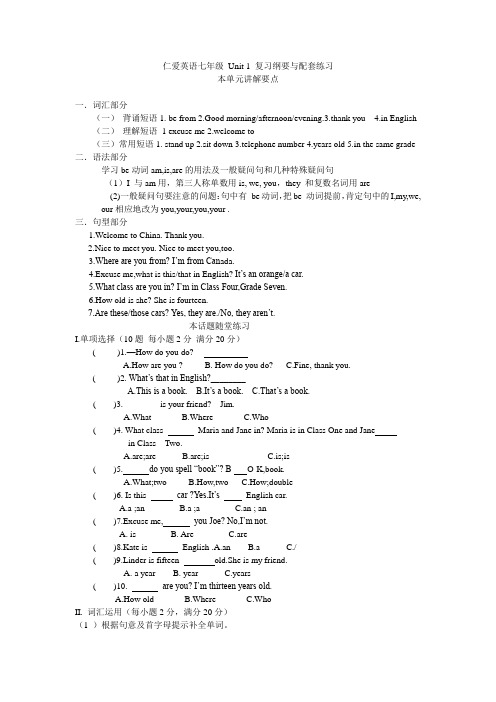
仁爱英语七年级Unit 1 复习纲要与配套练习本单元讲解要点一.词汇部分(一)背诵短语1. be from 2.Good morning/afternoon/evening.3.thank you 4.in English (二)理解短语 1 excuse me 2.welcome to(三)常用短语1. stand up 2.sit down 3.telephone number 4.years old 5.in the same grade 二.语法部分学习be动词am,is,are的用法及一般疑问句和几种特殊疑问句(1)I 与am用,第三人称单数用is, we, you,they 和复数名词用are(2)一般疑问句要注意的问题:句中有be动词,把be 动词提前,肯定句中的I,my,we,our相应地改为you,your,you,your .三.句型部分1.Welcome to China. Thank you.2.Nice to meet you. Nice to meet you,too.3.Where are you from? I’m from Can ada.4.Excuse me,what is this/that in English? It’s an orange/a car.5.What class are you in? I’m in Class Four,Grade Seven.6.How old is she? She is fourteen.7.Are these/those cars? Yes, they are./No, they aren’t.本话题随堂练习I.单项选择(10题每小题2分满分20分)( )1.—How do you do?--A.How are you ?B. How do you do?C.Fine, thank you.( )2. What’s that in English?________A.This is a book.B.It’s a book.C.That’s a book.( )3. ________is your friend? Jim.A.WhatB.WhereC.Who( )4. What class Maria and Jane in? Maria is in Class One and Janein Class Two.A.are;areB.are;isC.is;is( )5. do you spell “book”? B- O-K,book.A.What;twoB.How,twoC.How;double( )6. Is this car ?Yes.It’s English car.A.a ;anB.a ;aC.an ; an( )7.Excuse me, you Joe? No,I’m not.A. isB. AreC.are( )8.Kate is English .A.an B.a C./( )9.Linder is fifteen old.She is my friend.A. a yearB. yearC.years( )10. are you? I’m thirteen years old.A.How oldB.WhereC.WhoII. 词汇运用(每小题2分,满分20分)(1 )根据句意及首字母提示补全单词。
Unit 1 要点解析
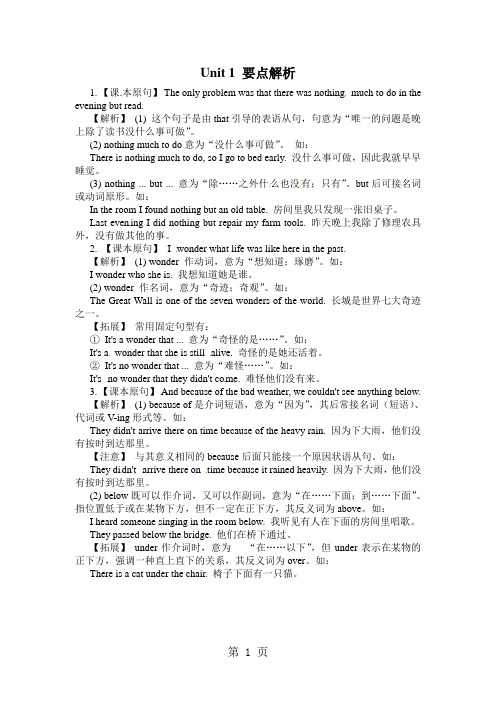
Unit 1 要点解析1. 【课本原句】The only problem was that there was nothing much to do in the evening but read.【解析】(1) 这个句子是由that引导的表语从句,句意为“唯一的问题是晚上除了读书没什么事可做”。
(2) nothing much to do意为“没什么事可做”。
如:There is nothing much to do, so I go to bed early. 没什么事可做,因此我就早早睡觉。
(3) nothing ... but ... 意为“除……之外什么也没有;只有”。
but后可接名词或动词原形。
如:In the room I found nothing but an old table. 房间里我只发现一张旧桌子。
Last even ing I did nothing but repair my farm tools. 昨天晚上我除了修理农具外,没有做其他的事。
2. 【课本原句】I wonder what life was like here in the past.【解析】(1) wonder 作动词,意为“想知道;琢磨”。
如:I wonder who she is. 我想知道她是谁。
(2) wonder 作名词,意为“奇迹;奇观”。
如:The Great Wall is one of the seven wonders of the world. 长城是世界七大奇迹之一。
【拓展】常用固定句型有:①It's a wonder that ... 意为“奇怪的是……”。
如:It's a wonder that she is still alive. 奇怪的是她还活着。
②It's no wonder that ... 意为“难怪……”。
如:It's no wonder that they didn't co me. 难怪他们没有来。
Unit 1-Uni4 复习要点
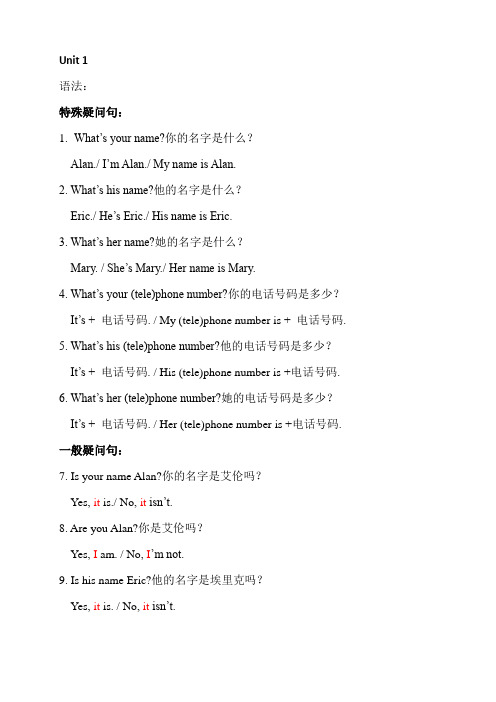
Unit 1语法:特殊疑问句:1.What’s your name?你的名字是什么?Alan./ I’m Alan./ My name is Alan.2. What’s his name?他的名字是什么?Eric./ He’s Eric./ His name is Eric.3. What’s her name?她的名字是什么?Mary. / She’s Mary./ Her name is Mary.4. What’s your (tele)phone number?你的电话号码是多少?It’s + 电话号码. / My (tele)phone number is + 电话号码.5. What’s his (tele)phone number?他的电话号码是多少?It’s + 电话号码. / His (tele)phone number is +电话号码.6. What’s her (tele)phone number?她的电话号码是多少?It’s + 电话号码. / Her (tele)phone number is +电话号码. 一般疑问句:7. Is your name Alan?你的名字是艾伦吗?Yes, it is./ No, it isn’t.8. Are you Alan?你是艾伦吗?Yes, I am. / No, I’m not.9. Is his name Eric?他的名字是埃里克吗?Yes, it is. / No, it isn’t.10. Is he Eric?他是埃里克吗?Yes, he is./ No, he isn’t.11. Is her name Mary?她的名字是玛丽吗?Yes, it is. / No, it isn’t.12. Is she Mary?她是玛丽吗?Yes, she is. / No, she isn’t.重点句子:1.Nice to meet you.见到你很高兴。
人教版_高中英语必修一unit1_知识点总结
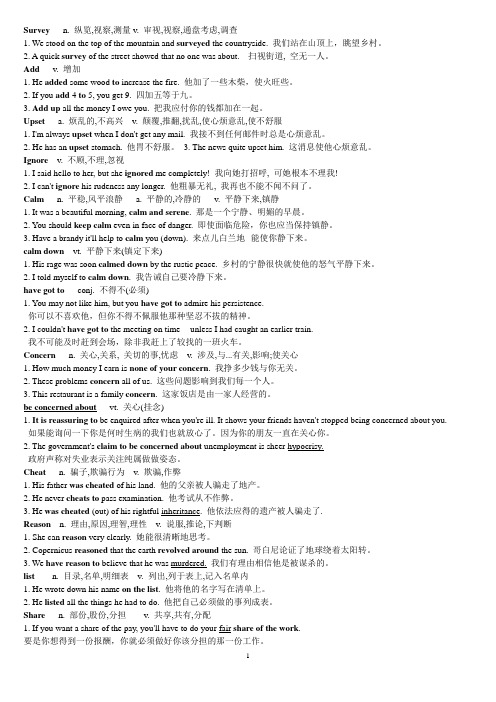
Survey n. 纵览,视察,测量v. 审视,视察,通盘考虑,调查1. We stood on the top of the mountain and surveyed the countryside. 我们站在山顶上,眺望乡村。
2. A quick survey of the street showed that no one was about. 扫视街道, 空无一人。
Add v. 增加1. He added some wood to increase the fire. 他加了一些木柴,使火旺些。
2. If you add 4 to 5, you get 9. 四加五等于九。
3. Add up all the money I owe you. 把我应付你的钱都加在一起。
Upset a. 烦乱的,不高兴v. 颠覆,推翻,扰乱,使心烦意乱,使不舒服1. I'm always upset when I don't get any mail. 我接不到任何邮件时总是心烦意乱。
2. He has an upset stomach. 他胃不舒服。
3. The news quite upset him. 这消息使他心烦意乱。
Ignore v. 不顾,不理,忽视1. I said hello to her, but she ignored me completely! 我向她打招呼, 可她根本不理我!2. I can't ignore his rudeness any longer. 他粗暴无礼, 我再也不能不闻不问了。
Calm n. 平稳,风平浪静 a. 平静的,冷静的v. 平静下来,镇静1. It was a beautiful morning, calm and serene. 那是一个宁静、明媚的早晨。
2. You should keep calm even in face of danger. 即使面临危险,你也应当保持镇静。
Unit 1 知识点复习 仁爱版英语九年级上册

单元知识点总结Name:_____________Unit 1 The changing worldTopic 1 our country has developed rapidly.Section A1.Kangkang is happy to see his friends.【知识点】be happy to=be glad to do sth. 做某事很开心2.There were so many people that I couldn’t find a good place to take photos.Mr. Brown is such a kind teacher that well like him.(U1T2SA)【知识点】如此...以至于:so....that; such...that【用法】so+adj./adv.+that+句子; such+(a/an)+adj.+n.+that+句子【注】当名词前有“many/much/few/little”时,要用so...that,即:so+many/much/few/little+n.+that+其它3.There goes the bell.【知识点】倒装句So do I.(U1T2SA)【知识点】倒装句,译为“我也是”So+助/情/Be+主。
;【否】neither/nor++助/情/Be+主。
Section B4.You took part in some volunteer activities during the summer holidays, didn’t you?【知识点】反意疑问句:【原则】前肯后否;前否后肯5.1)What a wonderful experience! 2)How interesting!【知识点1】experience:n. 经历(可数);经验(不可数)【知识点2】感叹句:what+(a/an)+adj.+n.(+主+谓)!how+adj./adv.+(+主+谓)!6.I think it makes me happy to help others.【知识点1】宾语从句:【识别】V+句子【知识点2】it makes sb.+adj.+to do sth. 做某个事使某人....7.Though I had no time to travel, I still felt very happy.【知识点1】though/although引导让步状语从句。
人教版高一英语必修一unit1知识梳理和重点词汇解析
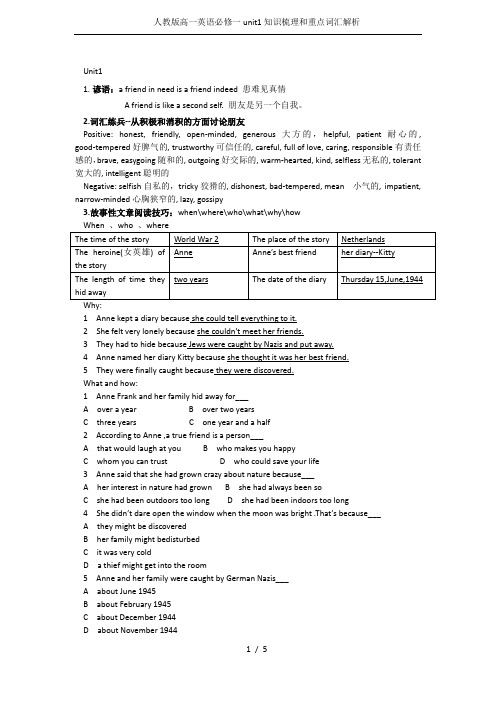
The date of the diary
Thursday 15,June,1944
Why:
1 Anne kept a diary becauseshe could tell everything to it.
2 She felt very lonely becauseshe couldn't meet her friends.
work out算出
课文词汇
lought at嘲笑
hid away躲起来
a series of一系列
grow\be crazy about对…十分狂热;十分痴迷
something\everything\anything to do with
与…有关的某事、一切
nothing to do with与…无关
be concerned about / for关心,挂念
E.g.① Every teacher is concerned aboutn’t go home on time, your parents will be concerned about your safety.
A about June 1945
B about February 1945
C about December 1944
D about November 1944
4、一首有情诗(旨在提高对友谊的认识)
A Forever Friend
Sometimes in life有时候在生活中
You find a special friend你会找到一个特别的朋友
A they might be discovered
B her family might bedisturbed
初一仁爱英语第一单元考点

初一仁爱英语第一单元的考点涵盖了多个方面,包括词汇、语法、听说读写技能以及文化知识等。
下面我将分点阐述:1. 词汇:* 人称代词:包括我(I),你(you),他/她(he/she),我们(we),你们(you),他们(they)等,是用来代替人、事物或行为的词。
* 频度副词:如always,usually,often,sometimes等,这些词表示动作发生的频率,即动作发生的次数多或少。
* 颜色词汇:如red,blue,green,yellow等,这些都是表示颜色的单词。
* 学科名词:如music,PE,maths等,这些是表示课程的名词。
2. 语法:* 陈述句:这是英语中最基本的句式,用于描述一个事实。
第一单元涉及的陈述句多为肯定句,即主语+谓语+宾语的结构。
* 特殊疑问句:这是仁爱英语中首次出现的疑问句式,通过特殊疑问词(如what,where,who等)来发问。
特殊疑问句主要用于课堂讨论和小组活动,有助于提高学生的口语表达能力。
* 情态动词can的用法:仁爱英语第一单元重点讲解了can这一情态动词,表示能力或可能性的表达。
3. 听说读写技能:* 听:本单元的听力练习主要集中在课堂活动和短文听力上,需要学生集中注意力,理解并记住关键信息。
* 说:仁爱英语非常注重学生的口语表达。
课堂活动包括角色扮演、讨论和故事接龙等,鼓励学生积极参与对话。
* 读:阅读材料丰富多样,包括短文、对话和图片,旨在培养学生的阅读理解能力和词汇量。
* 写:写作练习主要集中在完成句子、短文写作和填空等形式。
通过这些练习,学生可以锻炼他们的组词成句和语法意识。
4. 文化知识:* 本单元涉及中外不同的文化习俗和节日传统,如万圣节、圣诞节等,有助于学生了解中西方文化的差异。
* 音乐和运动在仁爱英语中占有重要地位,第一单元涉及了音乐和体育的相关话题,如音乐课、体育课和运动会等。
以上就是初一仁爱英语第一单元的主要考点。
通过系统的学习和练习,学生可以掌握这一单元的基本词汇、语法和技能,为以后的英语学习打下坚实的基础。
- 1、下载文档前请自行甄别文档内容的完整性,平台不提供额外的编辑、内容补充、找答案等附加服务。
- 2、"仅部分预览"的文档,不可在线预览部分如存在完整性等问题,可反馈申请退款(可完整预览的文档不适用该条件!)。
- 3、如文档侵犯您的权益,请联系客服反馈,我们会尽快为您处理(人工客服工作时间:9:00-18:30)。
Unit 1 要点复习姓名
一、短语默写
1.与某人一起学习: 2 制作单词卡片:
3 听录音磁带:
4 向某人求助:
5 看录像:
6 同某人谈话:
7 太... 而不能:8 作报告:
9 英语口语:10 起初:
11 逐词逐句地:12 …的秘诀:
13 害怕做某事:14 爱上…
15 肢体语言:16 小菜一碟:
17 查阅,抬头看:18 大声跟读:
19 在…犯错误:20 天生具有:
21 取决于:22 把…和…连接或联系起来:
23 尽力做某事:24 焦虑不安的:
二、句子(P2 ) 2d背诵
1.听懂英语口语太难了。
It’s too hard to understand spoken English.
2.我必须读完一本书,以便下周一作报告。
I have to finish reading a book and give a report next Monday.
3.一开始只管快速阅读获取文章大意就可以了。
Just read quickly to get the main ideas at first.
4.你读得越多,你阅读的速度就越快。
The more you read, the faster you’ll be.
P3 3a
1 语言学习的秘诀是什么?What is the secret to language learning?
2 因为我糟糕的发音,我害怕问问题。
I was afraid to ask questions because of my poor pronunciation.
3 之后有一天,我看了一部名为《玩具总动员的英文电影》。
我爱上了这部令人兴奋而
有趣的电影。
Then one day I watched an English movie called Toy Story, I fell in love with this exciting and funny movie!
4 尽管我并不能听懂各个角色说的所有台词,但他们的肢体语言和面部表情帮助我理解意思。
Although I could not understand everything the characters said, their body language and the expressions on their faces helped me to get the meaning.
5 但因为我想弄明白这个故事,所以我就查字典。
But because I wanted to understand the story, I looked them up in a dictionary.
6 我想学习新单词和更多的语法,以便更好地理解英文电影。
I want to learn new words and more grammar so that I can have a better understanding of English movies.
P6 2b
1.每个人天生具有学习的能力。
Everyone is born with the ability to learn
2. 但是你是否能学好取决于你的学习习惯。
But wheather or not you can do this well depends on your learning habits.
3. 研究表明,如果你对某件事情感兴趣,你的大脑就会
更活跃,你也更容易长时间关注它。
Studies shows that if you are interested in something,Your brain is more active and it is also easier for you to pay attention to it for a long time..
4. 例如,他们可能通过写下关键词或画思维图来做笔记。
For example, they may take notes by writing down key words or by drawing mind maps.
5. 练习并从错误中学习。
Practicing and learning from mistakes
6. 即使是你学得好的东西,如果你不使用,就会忘记。
Even if you learn something well, you will forget it unless you use it.
7. 知识来自质疑。
Knowledge comes from questioning。
